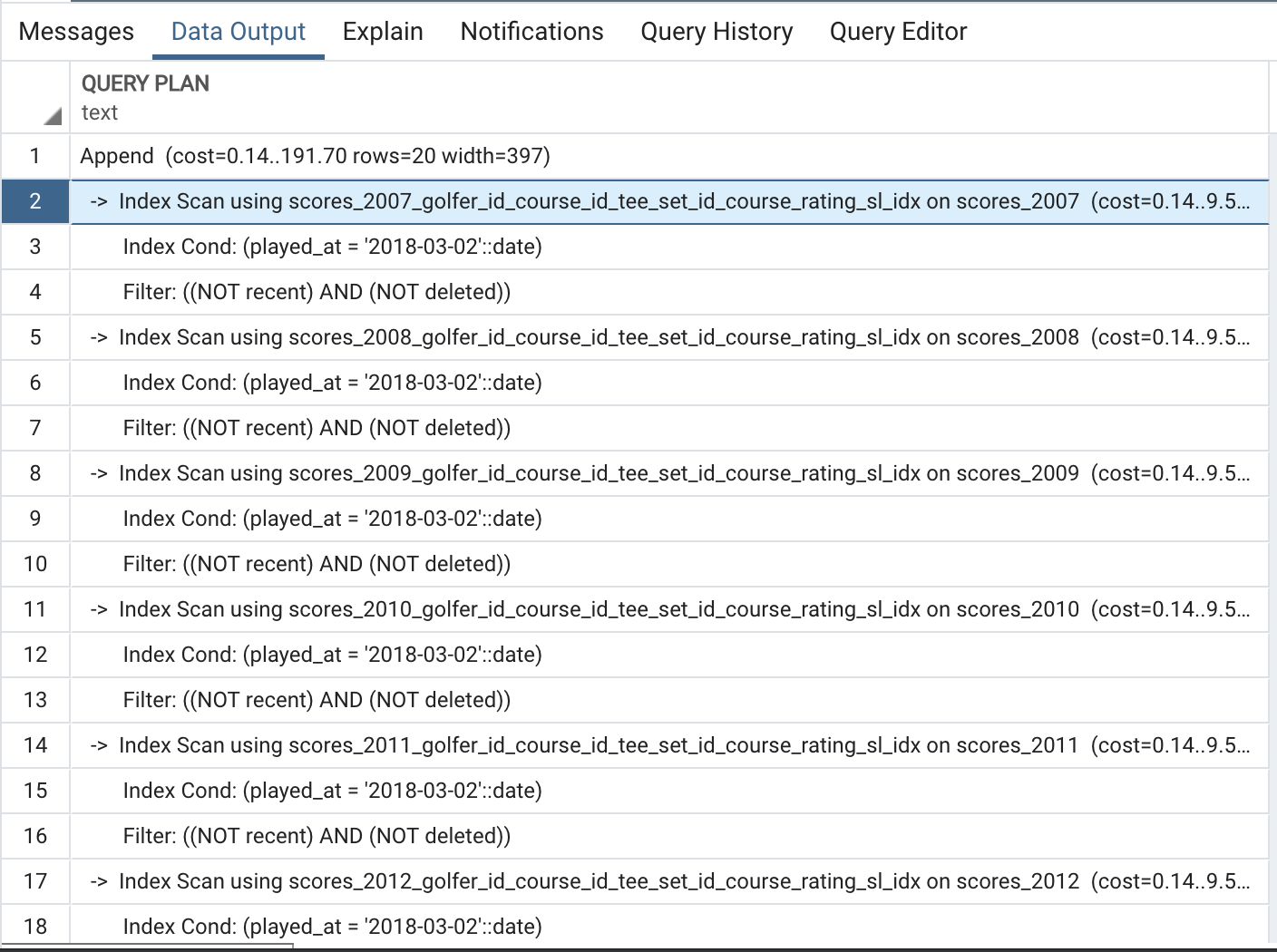Re: PG11 - Multiple Key Range Partition - Mailing list pgsql-bugs
| From | Rares Salcudean |
|---|---|
| Subject | Re: PG11 - Multiple Key Range Partition |
| Date | |
| Msg-id | CAHp_FN0QEGFJUMNN37o8BThKFqDBZVTyOWHDHKPd42zE2WRwRA@mail.gmail.com Whole thread Raw |
| In response to | Re: PG11 - Multiple Key Range Partition (David Rowley <david.rowley@2ndquadrant.com>) |
| Responses |
Re: PG11 - Multiple Key Range Partition
|
| List | pgsql-bugs |
Hi David,
Yield the same result:

I'm not sure what is your timeline, but can you provide an example with 3 key Range (2 booleans and 1 date) partition with a working select statement on the date?
First of all, thank you for the quick response, I highly appreciate it!
Currently, I'm trying to test out different query patterns to understand the key constraints and make the planner recognize the RANGE.
The example you suggested:
explain select * from scores where NOT(recent = true) and NOT(deleted = true) and played_at = '2018-03-02'
explain select * from scores where NOT(recent) and NOT(deleted) and played_at = '2018-03-02'
Yield the same result:

It does a search over all partitions, mainly because I think the planner still cannot match the where clause to the range.
I can not find any queries that output the desired results. And for the moment I like our strategy of having a partition for each year, plus the extra two (recent and deleted). In terms of Insert / Update / Deleted / Upsert / etc.. operations all works fine. I populated a DB with around 600 million rows and the partitions are populated correctly + operations except SELECT are working perfectly.
Furthermore, I am a bit confused about the fact that with 2 key range partitions (recent and played_at), all works perfectly as expected (event SELECT).
I saw you recommended sub-partitioning, we are defining each partition as in the example from the documentation.
I'm not sure what is your timeline, but can you provide an example with 3 key Range (2 booleans and 1 date) partition with a working select statement on the date?
Thank you very much and have a great day!
Rares
On Tue, Jul 9, 2019 at 12:49 AM David Rowley <david.rowley@2ndquadrant.com> wrote:
On Mon, 8 Jul 2019 at 21:17, Rares Salcudean
<rares.salcudean@takeofflabs.com> wrote:
> Currently, I'm trying to define a table with a range partition of 3 keys Recent, Deleted and Played At.
>
> There are multiple partitions:
>
> 1. scores_2018 (recent - false, deleted - false, played_at in (2018-01-01 / 2019-01-01)
> 2. scores_2017 (recent - false, deleted - false, played_at in (2017-01-01 / 2018-01-01)
> 3. scores_recent (recent - true, deleted - false, played_at in (1990-01-01 / 2090-01-01)
> 4. scores_deleted (recent - false, deleted - true, played_at in (1990-01-01 / 2090-01-01)
>
> When inserting all works fine, but when doing a select statement it does not correctly query over the correct partition, It searches on all partitions.
>
> explain select * from scores where played_at = '2018-03-01'
RANGE partitioning pruning works by the planner having knowledge that
your WHERE clause cannot yield rows that are within a partition's
range. Take your scores_2017 partition as an example, the range there
is (false, false, '2017-01-01') to (false, false, '2018-01-01'). The
planner cannot match your WHERE clause to that range since it's
missing any predicate that matches a prefix of the range. This is
similar to how a btree index on (recent, deleted, played_at) couldn't
be used efficiently to give you just rows with played_at on any given
date. You'd need something like: WHERE NOT recent AND NOT deleted AND
played_at = '2018-03-01' for it to know only the scores_2018 partition
can match.
(There was a bug fixed recently that caused some partitions in a range
partitioned table to be pruned accidentally, but you're not
complaining about that.)
You might want to look into sub-partitioning the table, however, see
the note in [1] about that.
[1] https://www.postgresql.org/docs/current/ddl-partitioning.html#DDL-PARTITIONING-DECLARATIVE-BEST-PRACTICES
--
David Rowley http://www.2ndQuadrant.com/
PostgreSQL Development, 24x7 Support, Training & Services
Attachment
pgsql-bugs by date:

